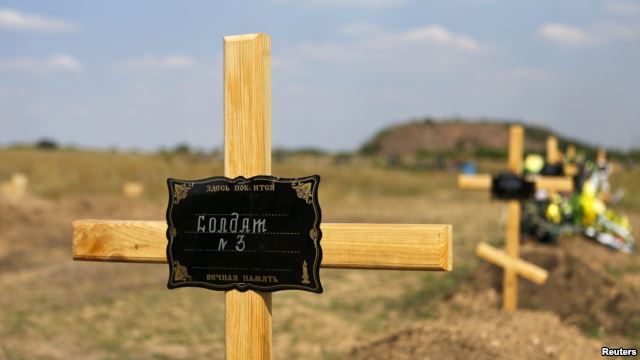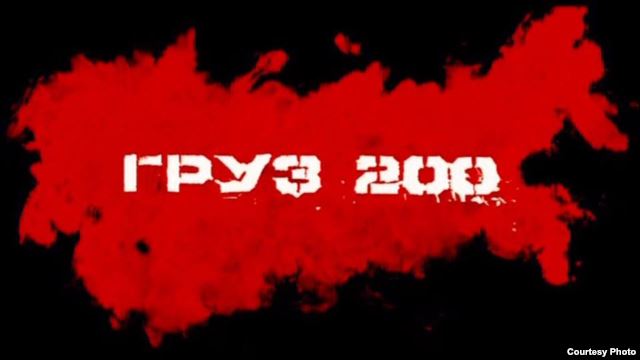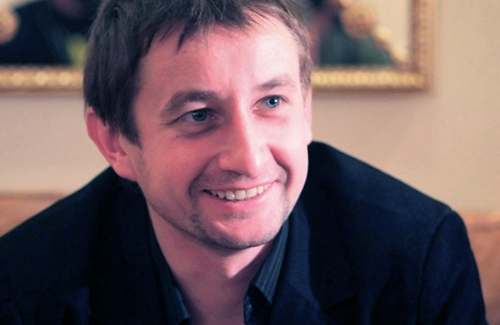Russia’s Ministry of Defense refuses to answer inquiries from the Soldiers’ Mothers organization about the deaths of Russian servicemen during the battles in the East of Ukraine.
Saint Petersburg human rights activists are fully committed to obtaining answers from the Russian Ministry of Defense to two questions: is it true that Russian servicemen are involved in military operations in Ukraine, and is it true that Russian soldiers are dying in the war.
The Soldiers’ Mothers of Saint Petersburg have backed up their formal inquiry into the participation of Russian soldiers in the war in Ukraine with materials received from specific military units such as these:

“It was announced to the servicemen in the military unit 71211 (331st Guards Airborne Regiment of Kostroma), who are currently located in Rostov Oblast, that they were no longer servicemen. Their contracts for active duty were being terminated, and at the moment they hold the status of “militiamen.” Moreover, it was announced to them that in the next few days they would be ordered to move in the direction of Mariupol (Ukraine).”
To her inquiry signed by a member of the Presidential Council on Human Rights, the chairwoman of the “Soldiers’ Mothers of Saint Petersburg” organization, Ella Poliakova, has received an answer which contained the following (the spelling and punctuation of the original has been preserved):
“Dear Ella Mikhailovna! Your inquiry, addressed to the head of the department of the Ministry of Defense of the Russian Federation of Social Services, has been examined in the (Russian) Airborne Troops Command. The information stated in your inquiry is incorrect. Your conjectures are based on information propagated in pro-Western media channels hostile to the Russian Federation. Keep calm and respect the defenders of our homeland. Your sincerely, deputy commander of the airborne troops on work with the personnel, Colonel V. Kupchishin.”
This answer did not satisfy the human rights activists. They saw elements of moralising in it, but did not see any concrete information on the specified military units. There was also no answer to the question whether the servicemen who had suffered gunshot and mine explosion injuries were undergoing medical treatment in the Military Medical Academy of Saint Petersburg. Furthermore, no answer at all followed the question about the death of servicemen in Ukraine, says Ella Poliakova:
“In our inquiry we asked for an explanation concerning the deaths of specific servicemen, in particular [those from] from the 18th army. I have copies of the set of documents on the death of Anton Tumanov. The place of death is not mentioned either in his [death certificate] or in the death certificate of other deceased, there is a dash [in its place]. We want to know why this is happening, where and how these servicemen died and why criminal investigations into their deaths have not yet been opened. Our list started with nine people, then two more were added, then those who Lev Schlossberg wrote about were added. At least Gudkov [a Russian politician and former Duma deputy] has received a formal reply to his inquiry from the Russian Ministry of Defense, [which stated] that they cannot disclose personal data and that all of this is fairy-tales of the foreign media, whereas we did not get any reply at all. But they are lawfully bound to reply.”
According to Ella Poliakova, the human rights activists are sending a second inquiry about the deceased, and if they do not obtain a reply this time either, they will then appeal to the court on behalf of the Presidential Council on Human Rights:
“The stance of the authorities is firm; they refuse to accept that Russian servicemen are fighting and dying in Ukraine, hence there is nothing new in the fact that the Soldiers’ Mothers committee did not receive an answer to their inquiry, supposes political scientist Sergei Shelin. “Besides, the concealment of military operations is widespread. They [the military operations] are not acknowledged by the Russian diplomacy in all of the contacts with its foreign partners. On no account will they be acknowledged either by the servicemen or by the investigative agencies. The whole authoritative machine is working synchronously. Regardless of the facts, they are not ready to admit what is deemed as obvious by the outside world, that Russia is sending its armed forces to take part in the conflict in Eastern Ukraine.
“Apparently, the consequences being drawn up in their minds following the acknowledgement of this fact do not suit our authorities at all, and they are ready to deny even those incidents which are seemingly impossible to refute. Whereas society is trying not to think about this war. I think that people aren’t being very sincere when replying to various surveys on this matter. Moreover, the majority believe that this war will not affect them in any way: neither their relatives, nor their children, nor their husbands would die there.”

The deputy of the Legislative Assembly of Saint Petersburg from the “Yabloko” faction, Boris Vishnevskiy, agrees with the fact that the Russian authorities will do all they can to continue concealing the involvement of Russian troops in the Ukrainian conflict:
“A big mass lie is at hand, the same as in the days of all the undeclared wars that Soviet servicemen took part in. After all, even back then it wasn’t acknowledged that we were fighting in North Korea, Yemen, Angola, Egypt, Ethiopia and other countries. This was all only acknowledged in 1995, with those who survived having been recognized as [war] veterans and given appropriate benefits. I think that the truth about the war in Ukraine will come to light as well: it is impossible to hide the deaths of people, even after having pressured their mothers, widows and other relatives. Even by intimidating someone, or bribing someone, complete silence will not be achieved. But I think that an order to lie while denying any facts is issued from the very top: hence they will be lying till the end. Although, admittedly, it would be impossible to keep doing this for a long time.”
The press secretary of the Soldiers’ Mothers of Saint Petersburg, Alexander Peredruk, is also certain that it will be impossible to conceal the truth about the Russian soldiers that are fighting in Ukraine for a long time, and he has even set specific target dates for when this truth will start to emerge:
“Now we have made an acquaintance with a lawyer, whose name we are deliberately not revealing. He told us about his client who has been held criminally liable for desertion for refusing to carry out [military] service. According to him, he was a contract soldier first sent to Rostov, and then he had to cross the border with Ukraine. We still have to check this information thoroughly, including that [information] on the initiation of criminal proceedings against this individual. This is why we are not disclosing his name either. But right now it is known for certain that a few servicemen were transferred from Rostov back to the Murmansk Oblast, to Pechenga.
“Right now these soldiers are within the [military] units. There are conscripts amongst them, and roughly in a month or two they will be demobilized, and then, I think, they will be able to tell a lot. One of them is an old acquaintance of mine, a friend, so we have personal connections there. It was indeed he who told me a while ago on the phone that his unit is being sent to Rostov-on-Don. Now we have to wait till those conscripts that have taken part in some [military] operations in Ukraine will be demobilized, and in half a year at the latest we will know many details. As for the official answer to our inquiries, we are not hoping for a more concrete answer than the one that was given to Gudkov. And indeed we are not even ruling out [the option of] taking legal action, so that further inquiries would then be sent on behalf of the court.”
The recently published results of a survey by the Levada Center suggest that more than half of Russians are not very interested in the death of Russian soldiers in Ukraine, while part of the people regard this data as being purely fabricated by the enemy. At the same time a sociologist, Mariya Mackevich, repeats that according to the surveys, the majority of the population has been opposing the war since the very beginning of the conflict, and were not expecting the deployment of Russian troops to Ukraine:
“The way the question is phrased is very important: if you ask people “are you for or against the war”, they of course will reply “against”. By the way, the surveys have shown, and this has surprised many commentators, that a large portion of people sympathized with the March for Peace in Moscow. However, people were barely aware of the purpose of this rally, while the words “March for Peace” for them clearly carried positive undertones. In other words, people don’t want war. The question about preparedness for casualties is a whole other matter. But the authorities know that people don’t want war, and thus they are saying that there is no war. And people are supporting them. Whereas when we are talking about the death of a specific serviceman, the reaction varies: some blame the state that sent their son to the war; others say yes he died, but he was carrying out orders.
“And one has to understand that by criticizing the war, we have no right to take away from the parents the awareness that their son has died while performing [his] duty. And this is quite compatible: yes we don’t want a war, but if a state sends a man somewhere where military operations are ongoing, the condemnation of the state for the death of the said man is by no means shared by all. The reason behind the lies is also clear: the authorities are fully aware that the majority of the population does not support war, hence the reason why all the means of propaganda assert that there is no war. So it’s as though the lie is created towards meeting the wishes of the citizens. This is also what it did during the war in Afghanistan – this is exactly the same line of behavior. If the war is undeclared, it is difficult to expect that the Russian Ministry of Defense will behave as though military operations are being officially conducted. This is why, just like during the war with Afghanistan, the relatives are being told that the man has died, and writing where and how he died on the tombstones is prohibited.”





